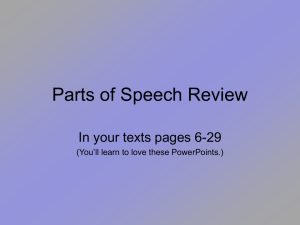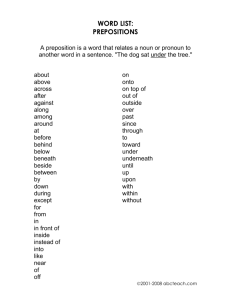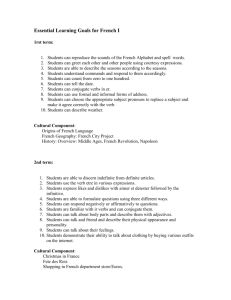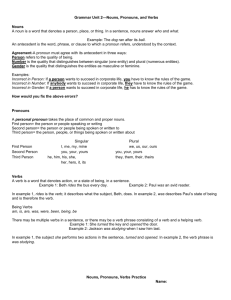Parts of Speech PowerPoint
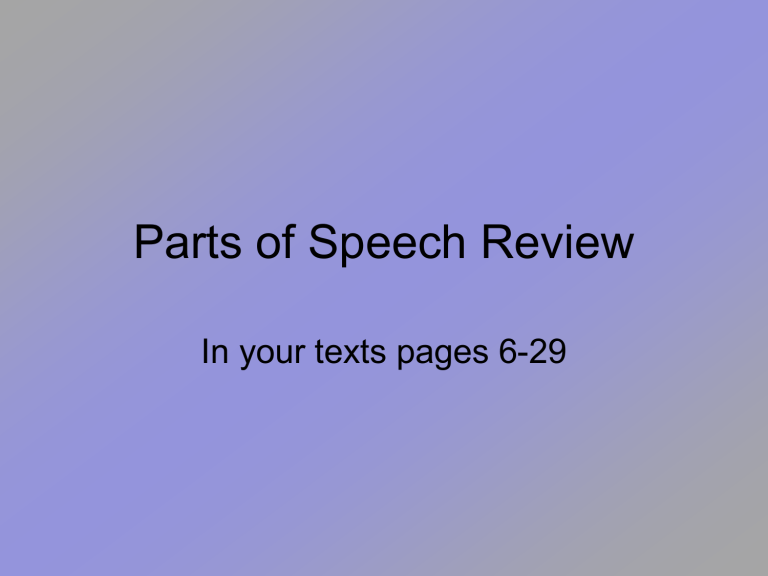
Parts of Speech Review
In your texts pages 6-29
Nouns
(if you don’t know most of this already, I’m going to cry.)
• Types of Nouns
– Person – students, teacher, Ms. Leech,
Shakespeare
– Place – school, La
Crosse, home
– Thing – yard stick, belt, referral
– Idea – sadness, love, surprise
• More Types of Nouns
– Common – bridge, river
– *Proper – Tim,
Waterford
– Concrete – shoe, car
– Abstract – truth, love, beauty
– Singular – detention
– Plural - detentions
*Pet peeve alert! I hate the fact that texting seems to have made some of you forget how to capitalize your own names!
Personal Pronouns
(Pay attention here, this is important)
• A pronoun is a word used in place of a noun or another pronoun
• An antecedent is the word that a pronoun replaces
– Ex. Tim forgot his book in his locker and so was given 10 Saturday detentions.
Antecedent Pronoun
Personal Pronouns
*First Person
*Second Person
Third Person
Singular
I, me
(my, mine) you
(your, yours)
Plural we, us
(our, ours) you
(your, yours) he, him, she, her, it
(his, her, hers, its) they, them
(their, theirs)
Big Tip! When you are writing papers in this class you may NOT use first or second person personal pronouns!
Other Kinds of Pronouns
• Reflexive Pronouns: reflects the subject of the sentence – there will always be at least one word between a reflexive pronoun and its antecedent.
– Ex. Seth Rog3n made himself a cup of coffee.
• Intensive Pronoun: emphasizes a noun or pronoun in the same sentence – almost always comes right after its antecedent.
– Ex. Luke Skywalker himself starred in Step Brothers .
• Reflexive and intensive pronouns are formed by adding –self or –selves to personal pronouns.
Other Kinds of Pronouns
• Demonstrative Pronouns: point out specific things: this, these, that, and those
– Ex. I prefer my chair to that over there.
• Indefinite Pronouns: refer to things not specifically identified – usually don’t have antecedents – another, nothing, on, both, all, any, more, etc.
– Ex. Everyone loves Star Wars !
Other Kinds of Pronouns
• Interrogative Pronoun: introduces a question – who, whom, whose, which, what
– Ex. Who is Luke Skywalker?
• Relative Pronoun: introduces a noun or adjective clause – who, whom, whose, which, that
– Ex. Luke Skywalker, who is the coolest person ever, flies in space.
Verbs
Expresses an action, a condition, or a state of being.
• Action Verb: expresses an…action!
– Transitive verb: takes an object
– Object: noun that receives the action
– Ex. Timmy kicked the cat.
• The cat is the object because it is the thing being kicked.
– In transitive verb: does not take an object.
– Ex. Ms. Leech snores at night.
Verbs
(This is the really important one that no one seems to know.)
• Linking Verbs: a verb that links the subject to a word in the predicate.
– Two forms of linking verbs
– Forms of to be
• is, am, are, was, were, been, being
• Ex. Home Alone is the coolest movie ever.
– Verbs that express condition
• look, smell, feel, sound, taste, seem, etc.
• Ex. The robbers look scary.
Verbs
Helping Verbs (or Auxiliary Verbs) and Verb
Phrases
• Helping verbs combine with other verbs to create verb phrases
• Verb phrases express a tense
• Ex. I will be getting a television for
Christmas this year.
Adjectives
An adjective modifies the meaning of a noun or pronoun.
• Ex. Green flowers, five flowers, etc.
Articles: a, an, the
Proper adjectives: formed from proper nouns, capitalized
• Shakespearean, Jamaican, etc.
Adverbs
An adverb modifies a verb, adjective, or another adverb.
Often (but not always) ends in –ly.
• Ex. Mike scrambled quickly from the bee hive.
• Ex. He was extremely upset.
• He had knocked down the hive quite accidentally.
Prepositions
Memorize ‘em! There are many more…memorize
‘em all! (pg 23 in your text)
About Before Down Of
Above Behind From On
After
Along Betwee
As
At
Beside In n
By
Into
Like
Despite Near
Out
Over
Since
To
Under
Up
Upon
With
Through With
Prepositional Phrases
A preposition shows the relationship between a noun and another word in the sentence.
A prepositional phrase starts with the preposition and ends with the next noun which is called the object of the preposition.
Ex. Counting Crows is the coolest band in the world.
object of the preposition preposition
Conjunctions
A conjunction connect words together.
• Coordinating conjunction: FANBOYS: for, and, nor, but, or, yet, so – memorize it!
• Correlative Conjunctions: Ex. both…and, neither…nor, either…or, not only…but also.
• There are two more types of conjunctions, but we’ll get to those later in the year.
Interjections
An interjection is a word or phrase the expresses a feeling.
• A strong interjection (Stop!) is followed by an exclamation point.
• A mild interjections (Oh,) is followed by a comma.
– Ex. Wow! This was the most exciting slide ever!
– Ex. Um, not really.





